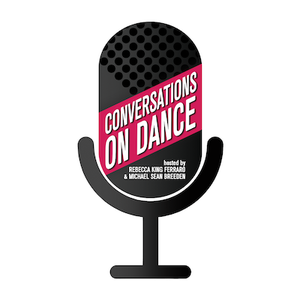
City Ballet The Podcast
New York City Ballet
- 59 minutes 27 secondsEpisode 127: The Rosin Box: Re-mounting Ballets
Claire and Aarón are joined at The Rosin Box this week by Sandra Jennings, a former NYCB dancer who is now a repetiteur for the George Balanchine Trust, for a conversation about staging ballets on current performers. As Sandra shares, she travels the world to coach companies of various ballet backgrounds in Mr. B's works, acting as a bridge between the choreographer's vision and the artists of today; as she explains, these ballets are "living, breathing works of art" that are brought to life by the individual dancers. (59:26)
Edited by Emilie Silvestri
Music: "Je ne t’aime plus" by Pink Martini Courtesy of Pink Martini & Heinz Records
25 November 2024, 10:00 am - 53 minutes 41 secondsEpisode 126: The Rosin Box: Company Class
This week, hosts Claire Kretzschmar and Soloist Aarón Sanz take the podcast from The Rosin Box to the barre for a conversation about company class, joined by Corps de Ballet Member Christina Clark and former NYCB dancer and current class teacher Amanda Edge. They talk all things real estate, fashion, and Destiny's Child vs. Ludwig Minkus, highlighting the importance of this daily ritual for building a sense of community as well as personal growth. (53:40)
Edited by Emilie Silvestri
Music: "Je ne t’aime plus" by Pink Martini Courtesy of Pink Martini & Heinz Records
18 November 2024, 10:00 am - 49 minutes 12 secondsEpisode 125: The Rosin Box: Ballet Myths
The Rosin Box returns! Hosts Claire Kretzschmar and Soloist Aarón Sanz are back with another candid conversation, joined this time by Principal Dancer Unity Phelan and Corps de Ballet Member Naomi Corti. They break down some of the most common myths about ballet and Company culture, from whether performers are like the characters in Black Swan to the pros and cons of dating other dancers, and what the perfect "ballerina pedicure" entails. (49:12)
Edited by Emilie Silvestri
Music: "Je ne t’aime plus" by Pink Martini Courtesy of Pink Martini & Heinz Records
11 November 2024, 10:00 am - 35 minutes 50 secondsEpisode 124: New Combinations: Caili Quan
Associate Artistic Director Wendy Whelan is back for a New Combinations conversation with Caili Quan, one of three women choreographers whose ballets make up this year's Fall Fashion Gala program. They discuss Quan's path from studying dance while growing up on Guam to moving to New York City and performing with BalletX for eight seasons, and her transition to full-time choreography. Quan shares the ways her culture, family, and sense of home emerge within the work and contribute to the "warmth, grace, and generosity of spirit" Whelan felt when watching Quan in the studio.
Music: "Sisyphus" by Andrew Wegman Bird Wixen Music Publishing, Inc. as agent for Muffet Music Co
30 September 2024, 2:01 pm - 57 minutes 20 secondsEpisode 123: Hear the Dance: Everywhere We Go
This week, host Silas Farley is back for another fascinating Hear the Dance conversation exploring Everywhere We Go. Silas is joined by Resident Choreographer Justin Peck and former Company Member Gretchen Smith, who met when they were barely teenagers dancing at the San Francisco Ballet School and collaborated several times over the ensuing years. Justin describes his development as a dance maker leading up the 2014 premiere, as well as his unique creative partnership with composer Sufjan Stevens, while Gretchen shares how dancing the ballet is "sheer joy." (57:19)
Written by Silas Farley Edited by Emilie Silvestri
Music: Everywhere We Go (2014) by Sufjan Stevens All music performed by the New York City Ballet Orchestra
Reading List: The Oxford Handbook of Contemporary Ballet Edited by Kathrina Farrugia-Kriel and Jill Nunes-Jensen Illinoise Broadway Musical: An In-Depth Review and Guide to the Illinois Theatre Play of Sufjan Stevens and Justin Peck Unveiling the Cast, Profile of Creators, Production Journey, Behind the Scenes, and Impact of the Show by Naomi Jeffrey Marcel Dzama: The Book of Ballet by Marel Dzama, Justin Peck, and Hans Christian Andersen Words Without Music: A Memoir by Philip Glass
23 September 2024, 9:00 am - 15 minutes 57 secondsEpisode 122: See the Music: Tschaikovsky Piano Concerto No. 2
This week's episode of City Ballet The Podcast is a previously recorded See the Music presentation hosted by NYCB Music Director Andrew Litton. Accompanied by the Orchestra and Solo Pianist Susan Walters, Maestro Litton describes why Tschaikovsky's Piano Concerto No. 2—the score for the Balanchine ballet of the same name—is less frequently performed than his first, despite being beloved by soloists and rich with beautifully romantic flourishes. Balanchine considered Tschaikovsky a "soulmate," a feeling borne out by his ability to make the composer's slightly less-genius works great with his choreography. (15:57)
Edited by Emilie Silvestri
Music: Symphony in Three Movements (1945) by Igor Stravinsky Piano Concerto No. 2 in G, Op. 44 (1879-80) by Peter Ilyitch Tschaikovsky
16 September 2024, 9:00 am - 49 minutes 58 secondsEpisode 121: Hear the Dance: Duo Concertant
City Ballet The Podcast returns just in time for the upcoming 24-25 Season. Hear the Dance host Silas Farley is joined by legendary former Principal Dancer and current School of American Ballet faculty member Kay Mazzo and Principal Dancer Anthony Huxley to discuss George Balanchine's Duo Concertant, one of the new works to premiere during the 1972 Stravinsky Festival. Mazzo shares her memories of the speed with which Balanchine choreographed each of the four movements, and commiserates with Huxley on the many unique challenges the ballet presents, including interacting with the piano and violin that share the stage—a "commentary on the festival itself," in Farley's words, as it honored Stravinsky's music and his importance to the Company. (48:57)
Written by Silas Farley
Music: Concerto for Violin and Orchestra in D major (1931) by Igor Stravinsky All music performed by the New York City Ballet Orchestra
Reading List: Stravinsky and Balanchine: A Journey of Invention by Charles M. Joseph Mr. B: George Balanchine’s 20th Century by Jennifer Homans Stravinsky’s Ballets by Charles M. Joseph Stravinsky Inside Out by Charles M. Joseph An Autobiography by Igor Stravinsky Stravinsky: A Creative Spring: Russia and France, 1882-1934 by Stephen Walsh Stravinsky: The Second Exile: France and America, 1934-1971 by Stephen Walsh Stravinsky: Chronicle of a Friendship by Robert Craft Stravinsky: Discoveries and Memories by Robert Craft The Stravinsky Festival of The New York City Ballet by Nancy Goldner Balanchine’s Ballerinas: Conversations with the Muses by Robert Tracy Balanchine Variations by Nancy Goldner
9 September 2024, 9:00 am - 40 minutes 44 secondsEpisode 120: Bonus: 23-24 Season Wrap-Up
As the Company concludes a Diamond Anniversary season absolutely bursting with repertory favorites, new restorations, world premieres, and successful tour stops around the world, Artistic Director Jonathan Stafford and Associate Artistic Director Wendy Whelan talk about what went into planning and presenting the year's many achievements. From triumphant debuts to the return of dancers featured in NYCB's original opening night 75 years ago, and a number of significant firsts on the Company's stage—including the first new work from Artist in Residence Alexei Ratmansky, the first Black Dewdrops in George Balanchine's The Nutcracker®, and the first non-binary pas de deux in Justin Peck's The Times Are Racing—they had much to celebrate, all while looking toward NYCB's, and the artform's, ever-expanding future. (40:43)
Edited by Emilie Silvestri
Music: Capriccio for Piano and Orchestra (1929) by Igor Stravinsky Symphony No. 3 in D major, Op. 29 (1875) by Peter Ilyitch Tschaikovsky
17 June 2024, 9:00 am - 46 minutes 11 secondsEpisode 119: The Rosin Box: Ask the Dancer
One of our favorite episodes of The Rosin Box has arrived: this season's Ask the Dancer! Hosts Claire and Aarón are joined by Corps de Ballet Member India Bradley to answer your questions and dish about everything dance life, from what's in her dance bag to the ballet that "woke her up" to the possibilities of ballet, which are her favorite costumes and how she likes to prepare for a performance, and beyond. (46:11)
Edited by Emilie Silvestri
Music: "Je ne t’aime plus" by Pink Martini Courtesy of Pink Martini & Heinz Records
10 June 2024, 9:00 am - 53 minutes 31 secondsEpisode 118: The Rosin Box: Dancing Your Way Out of It
This week, hosts Claire and Aarón are joined at The Rosin Box by Soloist Megan LeCrone who gets real about what happens when things do not go as planned onstage. As they all agree, a certain degree of unpredictability is unavoidable in a live performance art like ballet; knowing how to pivot and when to let go after the fact is essential for any dancer. Megan shares her own experiences with a malfunctioning backdrop in one case and a missed count in another, and what it's like to face the challenges—and thrive—in a "rite of passage" show. (53:30)
Edited by Emilie Silvestri
Music: "Je ne t’aime plus" by Pink Martini Courtesy of Pink Martini & Heinz Records
3 June 2024, 9:00 am - 39 minutes 32 secondsEpisode 117: The Rosin Box: Behind the Scenes of the Spring Gala
This week, The Rosin Box makes its star-studded season debut with an episode all about NYCB galas. Listen in on live coverage from the most recent red carpet with hosts Claire Kretzschmar and Soloist Aarón Sanz, and a post-fête conversation with Corps de Ballet Member and style maven Olivia Boisson. They'll discuss all the glitz and glamour and give helpful tips for thriving at these thrilling, twice-a-year events—including making the transition from pointe shoes to sky-high heels. (39:31)
Edited by Emilie Silvestri
Music: "Je ne t’aime plus" by Pink Martini Courtesy of Pink Martini & Heinz Records
27 May 2024, 9:00 am - More Episodes? Get the App
Your feedback is valuable to us. Should you encounter any bugs, glitches, lack of functionality or other problems, please email us on [email protected] or join Moon.FM Telegram Group where you can talk directly to the dev team who are happy to answer any queries.
 Unorthodox
Unorthodox
 Conversations on Dance
Conversations on Dance
 Second Life
Second Life
 This Is TASTE
This Is TASTE
 Dinner SOS by Bon Appétit
Dinner SOS by Bon Appétit